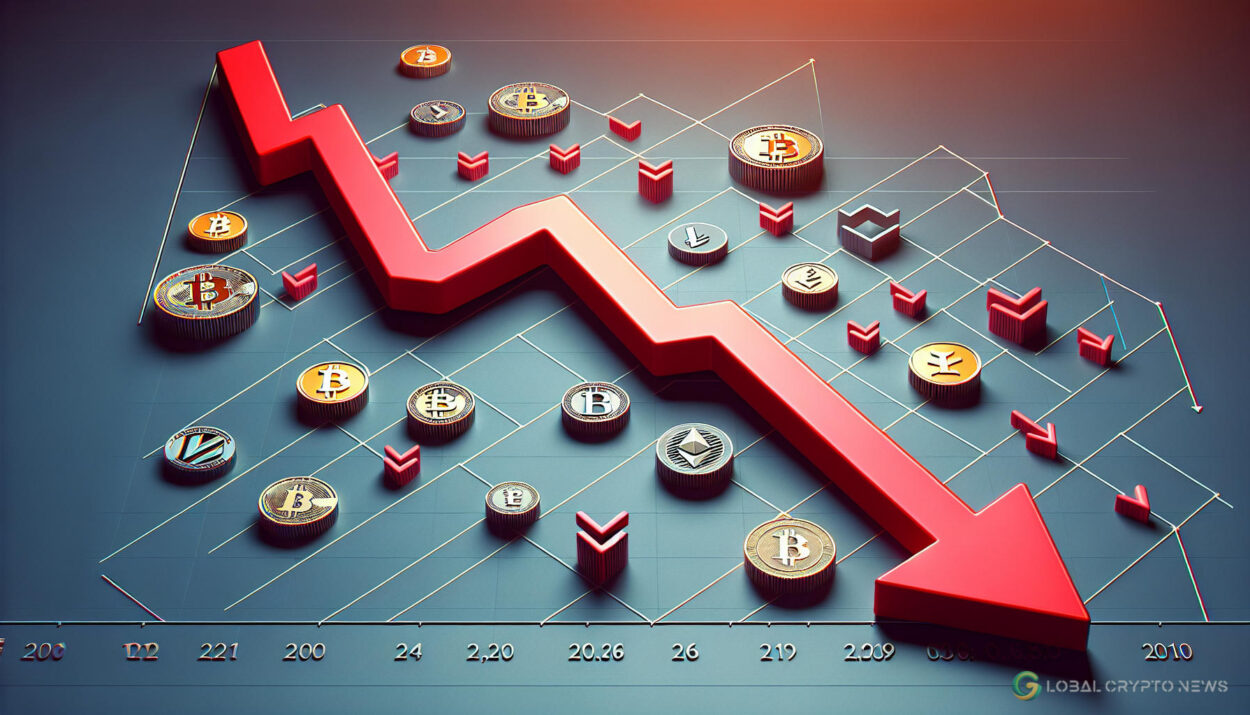The crypto market has experienced a severe crash, causing significant concern among investors. As of August 5, the global crypto market cap stands at $1.81 trillion, marking a 15.88% decrease in just one day, indicating a strong bear market.
Bitcoin has fallen over 25% in the last seven days, with nearly 15% of that drop occurring in the last 24 hours, now trading at $51,300. Ethereum has seen an even sharper decline, falling 32% in the last week and over 21% in the past day, trading at $2,238.
Other altcoins have also been affected, dropping between 40-50% over the week and 15-25% in the last 24 hours. The impact is not limited to the crypto market; major global stock indices like NASDAQ100 (U.S.), FTSE100 (UK), and NIFTY50 (India) have seen declines of 2-3% in a single trading session.
Japan’s Nikkei 225 has taken the worst hit, plunging nearly 14% in one day, marking its steepest decline since 1987. So, what are the global triggers causing this widespread panic?
What Happened to the Crypto Market?
U.S. Recession Fears
The U.S. job market is showing signs of trouble, fueling fears of a recession. The unemployment rate jumped to a nearly three-year high of 4.3% in July, up from 4.1% in June. Economists from Goldman Sachs have increased the probability of a U.S. recession next year to 25% from 15%.
Despite this, they noted there are “several reasons not to fear a slump,” even with the jump in unemployment. According to Goldman economists, “The economy continues to look fine overall, there are no major financial imbalances and the Fed has a lot of room to cut interest rates and can do so quickly if needed.”
However, there are concerns that the Federal Reserve may have “waited too long” to cut interest rates. Rising unemployment and potential recession fears are creating a ripple effect, leading investors to move away from volatile assets like crypto.
Nikkei 225 Crash
Japan’s financial system is undergoing critical changes, affecting markets worldwide. On July 31, Japan’s central bank raised its benchmark interest rate to “around 0.25%” from its previous range of 0% to 0.1%. This move disrupted the carry trade strategy, causing global financial adjustments.
The Nikkei 225 stock index plunged 12.4% on August 5. One of the factors driving the Bank of Japan to raise rates was the prolonged weakness in the Japanese yen, which has pushed inflation above the central bank’s 2% target.
The market sell-off in Japan is not occurring in isolation. Stocks began tumbling globally on August 2 after weaker-than-expected data on U.S. jobs sparked worries that high interest rates might push the U.S. economy into a recession.
Geopolitical Woes
Geopolitical tensions are another major factor impacting the crypto market. On August 3, tensions in the Middle East escalated as Iran and its allies prepared their response to the assassination of Hamas leader Ismail Haniyeh in Tehran. This followed the killing of Hezbollah’s military chief in Beirut, raising fears of a regional war.
The U.S., an ally of Israel, announced it would move warships and fighter jets to the region. Western governments urged their citizens to leave Lebanon, and airlines canceled flights.
The fear of a regional war and its potential global implications can lead to massive sell-offs in the crypto market as investors seek stability. Geopolitical instability often causes heightened volatility in both traditional and crypto markets.
What’s Next?
As the crypto market continues to tumble, let’s explore the insights of some industry figures and analyze their perspectives on the situation.
Alex Krüger, a macroeconomist, suggests the current debacle is driven more by macroeconomic factors rather than issues specific to crypto.
Krüger argues that the policy mistake wasn’t the Fed not cutting rates quickly enough, but rather the Fed not cutting rates while Japan hiked theirs, creating a financial crisis spurred by levered Japanese speculators.
Meanwhile, Justin Sun, the founder of Tron, remains optimistic despite the market downturn. He suggests that the industry has grown over the past year and that the current market fluctuations aren’t due to negative news.
In these turbulent times, exercise caution and stay informed. Diversify your portfolio to mitigate risks and avoid putting all your eggs in one basket. Consider setting stop-loss orders to protect your investments from further decline. Don’t make impulsive decisions based on fear or market hype, and never invest more than you can afford to lose.
For more insights and updates on the crypto market, stay tuned to Global Crypto News.
























